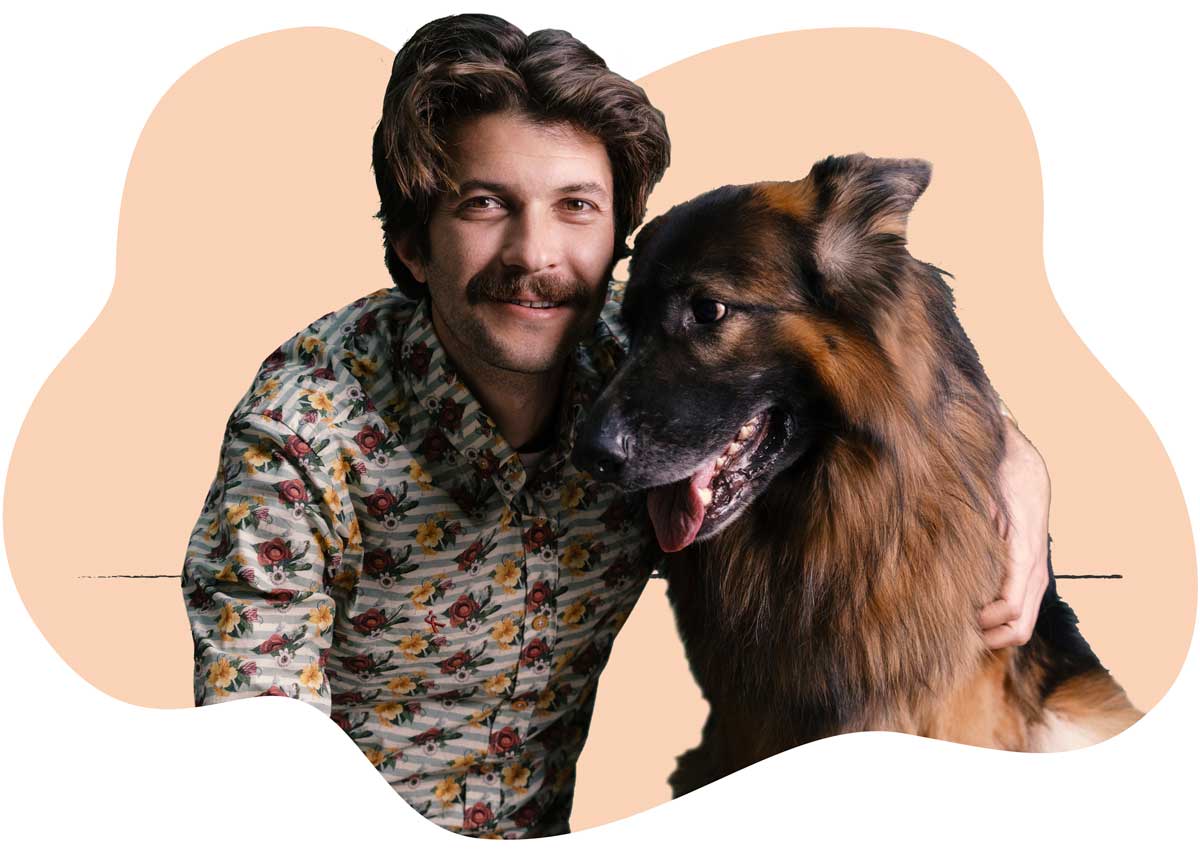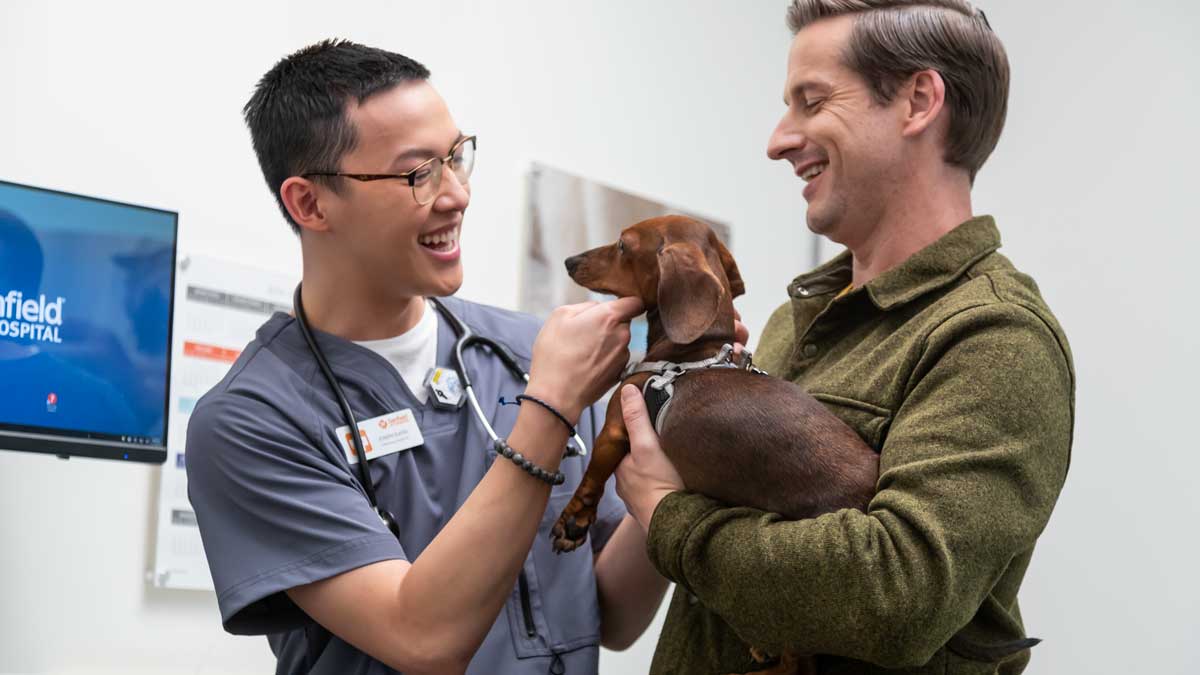senior dog and cat preventive care
Here’s what to know about caring for your sweet elder pup or cat.
Being a senior isn't a disease! But it is a life stage that brings new health risks. With the right preventive care, you can help your older pet stay their happiest and healthiest.

Preventive care for seniors
- Comprehensive exams
- Diagnostic testing
- Vaccinations
- Parasite control
- Diet
Worried about your older pet’s health?
Caring for a senior pet isn’t that different from caring for an adult pet. While aging itself isn’t a disease, seniors are at higher risk for age-related health conditions. In this life stage, it’s important to keep up on preventive care so you can stay ahead of age-related issues.
Why preventive care matters more for seniors
As pets age, they become more vulnerable to chronic conditions like arthritis, kidney disease, heart problems, and cognitive decline. Symptoms might not be easy to see, and older pets can have a faster decline. Preventive care — including regular vet checkups, blood work, dental cleanings, and screenings — helps catch these issues early, when they're often easier (and less expensive) to manage.

Catch issues early with twice-yearly vet exams
Senior pets should go to the vet at least twice a year for a comprehensive exam. This helps us detect any health issues or changes early, so we can address them without delay.
Comprehensive exams typically include an oral exam, abdominal palpation, and orthopedic evaluation. We will also want to know about your pet’s mobility at home to help spot beginning signs of mobility issues and arthritis.
What health issues can we catch early with testing?
When it comes to recommended diagnostic testing, senior dog or cat recommendations are more robust than adult dog or cat recommendations.
What tests does a senior dog really need?
- Fecal testing for parasites: two times a year
- Tick-borne disease: annually
- Heartworm: annually
- Complete blood count: every six months
- Chemistry panel: every six months
- Urinalysis: every six months
- T4 testing to check for thyroid issues and facilitate early intervention: annually
- SDMA to monitor kidney and heart function: every six months
- Blood pressure: every six months
What testing does an older cat need?
- Complete blood count: every six months
- Serum biochemistry panel: every six months
- Urinalysis: every six months
- T4 testing to check for thyroid issues and facilitate early intervention: annually
- SDMA to monitor kidney and heart function: every six months
- Blood pressure: every six months
Do older dogs and cats still need vaccinations?
They sure do, but talk to your vet to see which ones they recommend. They may reduce some based on your pet’s current lifestyle. Vaccinations are especially important at this life stage, because your senior pet’s immune system may be compromised by age. If your senior dog or cat were to catch an infectious disease, it may be more difficult to fight off.
Do senior pets need parasite and flea control?
Yes! In fact, senior pets sometimes have weaker immune systems, which can make it tougher to fight infections or secondary issues. Please make sure to continue administering flea, parasite, and tick prevention even if your senior pet is mainly homebound.
How do you check a senior dog’s or cat’s health? How do I know if my dog or cat is in pain?
Caring for your senior pet (or pet of any age!) takes a solid partnership between you and your vet. Since you spend the most time with your pet, it’s important to keep an eye on any health or behavioral changes and relay this info to your vet.
Some signs to look out for are:
- Changes in how they move or reluctance to get up
- Behavioral shifts like withdrawing or being grumpy, clingy, or aggressive
- Less interested in their usual activities like walks or playtime
- Appetite loss
- Changes in grooming or licking
- Vocalizing more or less than usual
- Restlessness, pacing, or difficulty sleeping
- Body posture like a tucked tail, hunched back, or tense muscles

Even if you don’t notice any changes, take your senior to the vet regularly for comprehensive exams. There, your vet will be able to professionally evaluate their health and recommend any further testing or treatments to keep your furball feeling their best.
Feeding your senior pet
You may or may not have to make changes to your older pet’s diet. But if they’re dealing with a chronic condition or disease, your vet may recommend a therapeutic diet.
Medically reviewed by Ari Zabell, DVM and Heidi Cooley, DVM.
Custom care that grows with your pet
You can save more than 30% by bundling your pet’s preventive care with an Optimum Wellness Plan. On top of comprehensive exams, vaccinations, and diagnostic testing, these convenient packages also include unlimited office visits, 24/7 Pet Chat™, discounts on most Banfield products, and more.
Our NEW Senior Care Optimum Wellness Plan includes our most in-depth diagnostic testing yet. This helps us detect changes in organ function and overall physical health, so that we can begin any recommended treatment as soon as possible.

Senior Care
Designed to help detect early signs of age-related illness
This plan combines essential services like vaccinations and exams with in-depth diagnostic testing.
See what’s included in Senior CareSenior Care Plus
Designed to help detect early signs of age-related illness and support additional dental needs
This plan includes all the services in our Senior Care plan plus a dental cleaning.
See what’s included in Senior Care Plus

 Mites and mange
Mites and mange Podcast - Not Just Fluff
Podcast - Not Just Fluff






